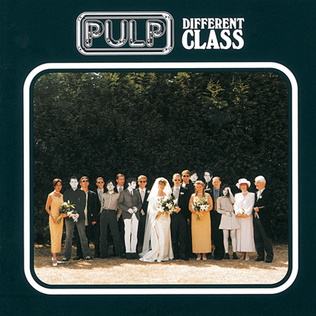One of the few musical chart battles given the same level of fanaticism and media attention as WrestleMania was most definitely the battle of Britpop. In 1995, the pending release of Blur’s “Country House” and Oasis’ “Roll with it” on the same day whipped British media into a frenzy over who would reign supreme on the charts. As a cultural moment, Britpop became more of a warzone than a genre; Oasis v. Blur, North v. South. It was at this moment that a 31 year-old Jarvis Cocker and his band Pulp presented us with a third option.
“We don’t want no trouble, we just want the right to be different. That’s all,”
reads the back of 1995’s Different Class, a quote that not only defines the album, but the band’s mission as a whole. Different Class is all about viewing life and love from the fringe; not all too different from Pulp’s history of spending 15 years in the artistic wilderness before finding some mainstream success with 1994’s His ‘n’ Hers, which landed them a last minute stand-in spot at the Glastonbury Music Festival.
The album wastes no time demonstrating this core message, with the first lyrics of the opening track “Mis-shapes”; “Mis-shapes, mistakes, misfits / Raised on a diet of broken biscuits, / Oh, we don’t look the same as you,” a reference to how stores would sell damaged products at a discounted price. It also sets up Cocker’s lyrical style. He plays multiple roles on the album; not only a singer, but a narrator and at times, a confidante, all with an underscore of dark cynicism and wordplay. The album shines with his ability to make the tamest of lines sound like he’s sharing a dirty secret with the audience, ranging from raspy whispers to near-wailing. The story of each song is at the forefront, supported by punchy instrumentals.
This synergistic relationship comes together most effectively on their lead single, “Common People.. The song’s narrative describes a classic boy-meets-girl at an art school, with one defining divide between them: their social classes. Although she’s living the broke art student lifestyle, she has a very wealthy father. The song evolves from a story into more of a tirade, where Cocker berates those who try to ‘blend in’ with the working class when they can avoid any real struggles thanks to their wealth and connections; “‘Cause everybody hates a tourist/Especially one who, who thinks it’s all such a laugh/Yeah, and the chip stains and grease will come out in the bath.” This is all supported by Candida Doyle’s upbeat, danceable keyboard, creating a pop hit reminiscent of earlier success “Babies.”
However, Pulp isn’t afraid to switch it up on a listener without warning, the next song, “I Spy” begins with sorrowful, almost gothic strings. Cocker also spends a good portion of the song speaking over music, setting the themes of class warfare, infidelity, love and voyeurism, which are heavily present throughout the rest of the album.
Marco Rivera Rosa, a sophomore in the School of Music, also noticed a subtler connection in “Disco 2000,” which is a song calling for a teenage crush to meet with the speaker in the year 2000. “That’s ‘Saturday Night’s Alright for Fighting,’ except in this song it’s more longing for old times and how he would’ve stayed with the girl if he was better,” said Rosa, noting similarities between the Elton John track’s chord progression and beat pattern. “Which kinda makes sense because it could be calling back to their teenage years,” he said. His findings speak to the multiple layers of meaning within the album’s sound.
When asked about their favorite song, sophomore Cayte Worthington chose “Monday Morning,” “The lyrics are something I can relate to currently,” said Worthington as the song speaks about the monotonous nature of the workweek. As a recent study from the American Education Research Association found that 43% of full-time college students and 81% of part-time students work while enrolled in college, students are no strangers to the oftentimes repetitive nature of jobs.
The fact that nearly 30 years after its initial release, Different Class still striking chords within people proves just how impressive the album is in its messaging. Although listeners who aren’t familiar with the band already might suffer from some tonal whiplash, especially between “Common People” and “I Spy,” as well as “Monday Morning” and “Bar Italia,” this album is worth a listen. It may be a good idea to acclimate with the poppier sound of His ‘n’ Hers before diving into Different Class completely blind. Despite Pulp’s reputation as “indie nobodies”, (an actual quote from Wet Wet Wet’s lead vocalist), the seamless blend of storytelling, social issues, and instrumentals found within Different Class create a work of art that retains its relevance in this decade.
